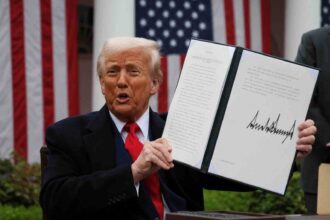The U.S. Department of Justice has filed an appeal challenging a federal judge’s decision to block President Donald Trump’s controversial executive order targeting the prominent law firm Jenner & Block.
This latest legal move marks the second time the Trump administration has sought to overturn federal court rulings that have invalidated punitive actions against major law firms. The administration previously appealed a similar decision favoring Perkins Coie, setting the stage for a potential landmark appellate ruling on presidential authority and legal retaliation.
Jenner & Block was one of six law firms specifically targeted by Trump. The firm previously employed Andrew Weissmann, a high-profile legal analyst and outspoken Trump critic who played a key role in Special Counsel Robert Mueller’s investigation into Russian interference in the 2016 election.
Trump’s executive orders imposed sweeping restrictions, including revoking security clearances for firm employees and initiating a review of all federal contracts held by the firm. These actions were framed by the administration as necessary for “addressing risks” to national security.
However, U.S. District Judge John Bates—appointed by former President George W. Bush—rejected the executive order as unlawful. In his ruling, Bates condemned the order as a clear attempt to “chill legal representation the administration doesn’t like,” warning that such tactics threaten the foundational separation of powers by shielding the executive branch from judicial oversight.
The administration has countered, arguing that the president has broad discretion over matters of national security and determining which entities should be entrusted with sensitive information.
So far, four law firms, Jenner & Block, Perkins Coie, WilmerHale, and Susman Godfrey, have challenged the executive orders in court and secured favorable rulings. Other firms reportedly chose to either comply with the administration’s demands or quietly accept penalties without mounting legal challenges.
One notable exception is Paul, Weiss, which saw its order rescinded after it agreed to a $40 million pro bono commitment supporting administration-aligned causes, eliminated its diversity and inclusion initiatives, and pledged not to deny legal representation based on clients’ political views.
At least nine law firms entered into similar arrangements, collectively pledging nearly $1 billion in free legal services in exchange for being spared further executive action.
These backroom deals are now under scrutiny by Democratic lawmakers on the House Oversight and Government Reform Committee, who have launched an investigation into the apparent quid pro quo.
Following the DOJ’s notice of appeal, Jenner & Block reaffirmed its position, standing by Judge Bates’s ruling.
“The district court correctly declared that Jenner’s clients have a right to independent counsel and that the firm’s right to represent clients vigorously and without compromise is sacred,” the firm stated. “We look forward to confirming this on appeal.”








